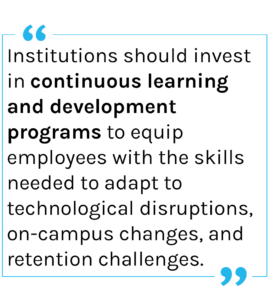Are you ready to tackle the HigherEd HR challenges coming in 2024?
As we approach 2024, the landscape of higher education human resources is poised to encounter a new set of challenges. Anticipating and preparing for these challenges is crucial for HR departments to navigate the evolving demands of the workforce. In this blog, we’ll dive into some of the challenges your team should anticipate, as well as innovative solutions to tackle them head-on.
Anticipated HR Challenges in 2024
1. Talent Acquisition in a Competitive Market
The competition for top talent is expected to intensify in 2024, making it challenging for higher education institutions to attract skilled professionals, especially in niche industries. To address this challenge, institutions should consider investing in employer branding, providing growth opportunities, and offering attractive compensation packages. Leveraging technology like AI-driven recruitment platforms can streamline the hiring process and help in identifying and attracting top talent.
2. Remote Work Management and Hybrid Models
The shift towards remote work and hybrid models isn’t going anywhere, and will continue to pose challenges in managing and maintaining a cohesive workforce. HR departments should focus on developing policies and practices that support remote work, ensure effective communication, and foster a sense of belonging among remote and on-site employees.
3. Reskilling and Upskilling the Workforce
Technology is continuing to disrupt industries, including HigherEd, making it important that your team focuses on reskilling and upskilling of the workforce to stay competitive. Institutions should invest in continuous learning and development programs to equip employees with the skills needed to adapt to technological disruptions, on-campus changes, and potential retention challenges.
4. Managing a Multigenerational Workforce
Your campus is already a multigenerational space, and the on-campus workforce is no exception. With Gen Z joining the workforce, and a tough economy that might discourage retirement, your faculty and staff come from multiple generations with unique work and communication styles and preferences. This can be a challenge, because it’s tough to please everyone, but embracing flexibility and dynamic communication styles can help create a positive work environment for everyone.
How to Prepare for 2024
As you consider the challenges to come, don’t get overwhelmed—there’s a lot your team can to do prepare. Here are a few ways to get started.
1. Embrace Technology and Innovation
Investing in HR technology solutions that facilitate talent acquisition, remote work management, and skills development will be crucial for higher education HR departments. Leveraging hiring and recruitment platforms, learning management systems, and communication tools can streamline processes and make your workforce more agile.
2. Prioritizing Leader and Manager Development
According to Gartner’s annual HR Priorities survey, leader and manager development tops the list of 2024 priorities for HR leaders. Institutions should focus on developing leadership capabilities to navigate the evolving work environment, build a talent pipeline, drive succession planning, and empower organizational success.
3. Build a Culture of Continuous Learning
In response to the need for reskilling and upskilling, higher education institutions should prioritize continuous learning and development programs. This includes offering relevant courses, workshops, and certifications to ensure that employees are equipped with the skills needed to adapt to technological disruptions
Final thoughts
HigherEd HR departments must take a proactive approach to the challenges of 2024, and that can make all the difference for their campuses. By embracing technology, prioritizing leader and manager development, creating a culture of continuous learning, and listening to the needs of employees, institutions can navigate the evolving HR landscape and ensure a resilient and adaptable workforce.